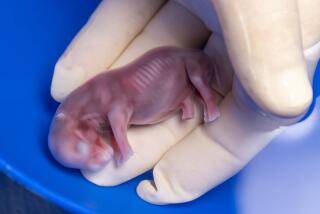Monkey Embryos Grown From Eggs
- Share via
WASHINGTON — Scientists who created a furor by cloning human embryos said Sunday they had made monkey eggs grow into embryos without the benefit of sperm, in a process known as parthenogenesis.
They said their experiments showed the potential for using the therapy to provide tailored medical treatments for women, or perhaps to use eggs donated by women to treat close relatives. They also opened new avenues of understanding basic biology.
Michael West, chief executive of Advanced Cell Technology Inc., said his company hopes to use such experiments to find ways to rejuvenate human tissues and to treat diseases.
“This whole field is so new. That is why we need all opportunities to be open,” he told a conference on regenerative medicine. West and other scientists at the conference called on the U.S. government to keep their research legal and to provide funding.
On Nov. 25, West said scientists at his Massachusetts-based company had cloned three human embryos using nuclear transfer--taking a human egg, removing the nucleus and replacing it with the nucleus from another adult’s cell.
He also said they had created one human embryo through parthenogenesis.
None of the tiny balls of cells lived long. Other scientists in the field criticized the work, saying West’s team had done nothing special.
They said that other experimenters had gotten eggs to generate to the same size without using nuclear transfer or the other methods employed by the ACT team. They said to be successful, the tiny embryos would need to divide to the blastocyst stage, which is when stem cells can be removed from embryos.
West’s presentation at Sunday’s conference partly answered critics.
The team got eggs taken from macaque monkeys to divide to blastocyst size.
“We got 14% of them forming blastocysts, and rather nice ones,” West told the conference.






